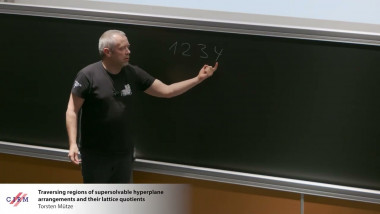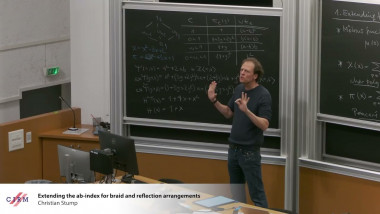
Traversing regions of supersolvable hyperplane arrangements and their lattice quotients
De Torsten Mütze

Extending the ab-index for braid and reflection arrangements
De Christian Stump
Apparaît dans la collection : International workshop on graph decomposition / Rencontre internationale sur les méthodes de décomposition de graphes
The chromatic number $\chi(G)$ of a graph $G$ is always at least the size of its largest clique (denoted by $\omega(G)$), and there are graphs $G$ with $\omega(G)=2$ and $\chi(G)$ arbitrarily large. On the other hand, the perfect graph theorem asserts that if neither $G$ nor its complement has an odd hole, then $\chi(G)=\omega(G)$ . (A "hole" is an induced cycle of length at least four, and "odd holes" are holes of odd length.) What happens in between? With Alex Scott, we recently proved the following, a 1985 conjecture of Gyárfás:
For graphs $G$ with no odd hole, $\chi(G)$ is bounded by a function of $\omega(G)$.
Gyárfás also made the stronger conjecture that for every integer $k$ and for all graphs $G$ with no odd hole of length more than $k$, $\chi(G)$ is bounded by a function of $k$ and $\omega(G)=2$. This is far from settled, and indeed the following much weaker statement is not settled: for every integer $k$, every triangle-free graph with no hole of length at least $k$ has chromatic number bounded by a function of $k$. We give a partial result towards the latter:
For all $k$, every triangle-free graph with no hole of length at least $k$ admits a tree-decomposition into bags with chromatic number bounded by a function of $k$.
Both results have quite pretty proofs, which will more-or-less be given in full.
